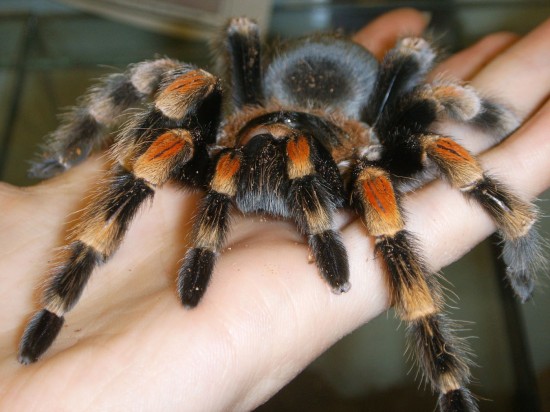

Tarantulas are unique and unusual animals, but it is fair to say that they are not an appropriate pet for everyone! Nevertheless, many spider fans have given some thought in the abstract to the idea of owning a pet tarantula. The desire to make an impulse purchase can often seem overwhelming if you happen to find yourself in a pet shop or specialist exotic pets retailer with a selection of tarantulas on sale and everything that you will need to house and keep one readily available, but it is really important not to buy a pet tarantula on a whim.
Do not fall for any of the convincing sales patter about how low maintenance and easy they are to keep, which is often part of the script in some less scrupulous pet shops. Considering buying and keeping any animal is not a decision that should be entered into lightly. When you factor in how delicate spiders are and the fact that tarantulas are also venomous (although quite how venomous is often overstated) it is easy to see that you should be ready to give the idea a lot of thought and spend a lot of time researching before deciding to go ahead with a purchase.
If you are considering buying your first pet spider, give these questions some serious thought first.
If so, then a tarantula is probably not for you. While many tarantula owners handle and hold their spiders on a regular basis, standard basic advice for the novice is that handling should be avoided as much as possible, for both your own safety and that of the spider. Tarantulas are not the type of animals that bond with their owners, or can be tamed and trained. The actions and responses of arachnids are all reactive and environmental, meaning that how calm, docile or otherwise your tarantula is will depend on how they are feeling at the time and if anything bothers them, rather than any learned behaviours. Tarantulas can of course also bite if threatened, and cause itching and skin irritations with the urticating hairs on their abdomens. They are hardly a warm, cuddly pet, despite their furry and often beautiful appearance!
Tarantulas are neither! They are undeniably fascinating and interesting to observe, even when they are not moving; but if you are looking for a pet that will do tricks or come to the front of their enclosure to wave to your friends on demand, you will soon find yourself bored! Tarantulas spend a great deal of their time doing absolutely nothing and often doing this out of sight, although it is fair to say that watching them stalk prey and eat live food is incredibly interesting to watch, if not for the faint hearted! They are also, of course, not the kind of pets that you can let out to wander around the house, as they are quick to disappear and hide, hard to find if lost, and prone to an impressive turn of speed when it suits them!
Like many invertebrates, people often assume that tarantulas are fairly short lived, and generally only survive for a couple of years. While this is true for many invertebrates, tarantulas are often the exception! There are significant variations between the life spans of various different types of tarantulas, but many varieties can live for upwards of twenty years when properly cared for, or even around thirty years for females of the species. So if you are looking for a short term, replaceable pet for a couple of years only, a tarantula is probably not the pet for you.
One of the most interesting things about tarantulas (and possibly the only time that you will observe much activity or enthusiasm in their behaviour)! Is when it is time to eat. Tarantulas will stalk and consume live prey such as crickets, which can be fascinating to watch, although not for the faint hearted.
Even if you are ok with the idea of seeing your pet eat live prey, there are other considerations to bear in mind. Feeding insects such as crickets to your tarantula means that you will have to keep live insects in your home, often have to gut load them (feed them a rich supplement that increases their nutritional content when fed to your spider) and actually handle them as well. Are you ok with that idea?
Tarantulas are of course, not native to the UK, and when keeping tarantulas as pets first became popular, most tarantulas offered for sale were imported fully-grown in bulk from their respective home countries. Nowadays, most tarantulas offered for sale are captive bred, particularly in the case of the most popular and commonly kept varieties, and buying a captive-bred tarantula shouldn’t be difficult.
Nevertheless, it is always important to find out the origins of any tarantula that you are considering buying, and make the decision to buy captive-bred specimens only. Not only can wild-caught tarantulas be more prone to a range of parasitic infections and other health problems, but there are sound ecological, welfare and conservation issues surrounding the live import of any animal from abroad.
Some species of tarantula (although these tend to be the rarer and less commonly kept varieties) are actually protected under commercial trade and conservation agreements, and importing, buying or selling wild-caught specimens of these types is both irresponsible and possibly illegal.
Always take the time to question the origins of any tarantula you are considering buying; if the seller is not knowledgeable about their origins or seems unwilling to answer your questions, keep shopping around for a more responsible seller.
Copyright © 2005-2016 Pet Information All Rights Reserved
Contact us: www162date@outlook.com